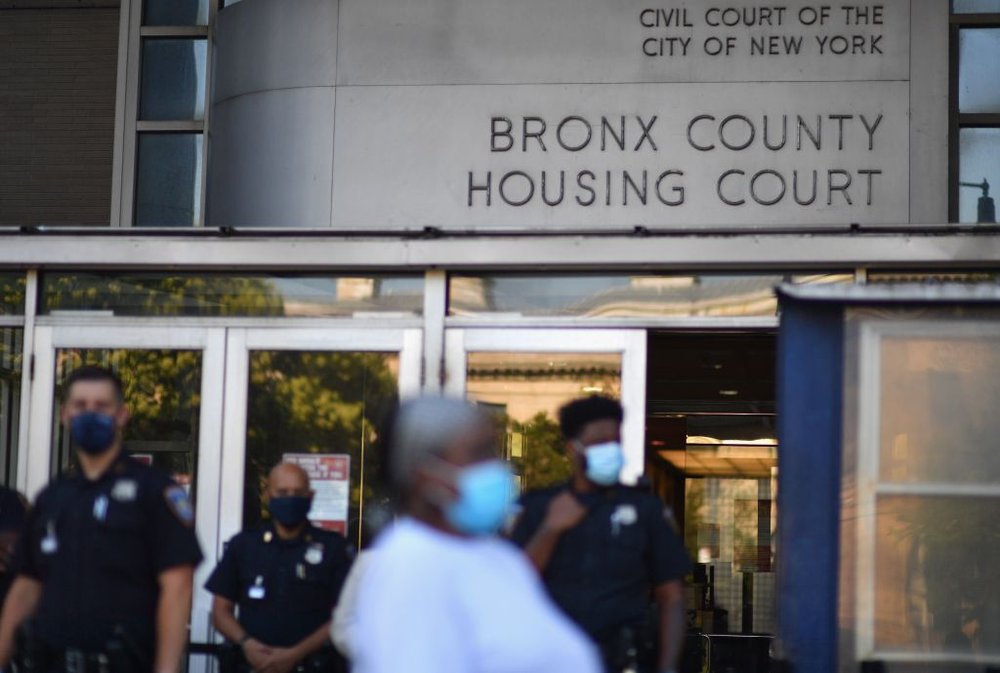With NYC evictions on the rise, these contractors made millions
Oct. 25, 2023, 5:01 a.m.
New York City’s 31 marshals nearly tripled their income after a freeze on most evictions ended last year, according to city data.

New York City marshals are cashing in again after losing out on millions of dollars during a nearly two-year eviction freeze, city records show.
The city’s 31 marshals earned a net income of about $11.6 million in 2022, nearly three times their take-home pay in the previous two years when the pandemic spurred a pause on evictions, according to the most recent annual report from the Department of Investigation, which oversees the marshals.
Three marshals earned a net income of $1 million after paying staff and sending the city a 4.5% cut on gross proceeds last year, the department's data shows. Queens-based marshal Martin Bienstock took in nearly $1.8 million, while Manhattan marshals Ronald Moses and Stephen Biegel made $1.4 million and about $1.1 million respectively, according to the department's records.
The marshals run their own offices and carry out evictions, boot and tow vehicles, and collect debts on behalf of creditors throughout the five boroughs.
But critics say the city is losing out on millions of dollars — and incentivizing aggressive debt collection strategies — by turning those responsibilities over to private, politically connected officers appointed to five-year terms by the mayor. The city received less than $1.2 million of the $25.2 million that marshals made in gross income last year.
Even former Mayor Bill de Blasio criticized the model during an appearance on "The Brian Lehrer Show" in 2018, saying it was time to “see if this approach makes sense at this point.”
Gothamist contacted all 30 marshals active in New York City this year to discuss their rebounding income and various responsibilities. None agreed to talk.
Staff for Bienstock, Moses and 16 other marshals said they were in the field, with several carrying out evictions or serving paperwork. Staff for Biegel and seven others referred questions to the Marshals Association, a trade group representing the officials.
Marshals Association spokesperson Michael Woloz said the “marshals play an important role for the city as far as revenue collection.”
“Marshals collect many millions of dollars annually for the city from parking scofflaws,” he said. “They complement the enforcement and collection efforts of the sheriff’s office.”
DOI spokesperson Diane Struzzi said the agency does not record how much revenue stems from evictions. Struzzi declined to comment when asked why the city needs marshals, citing DOI’s oversight role.
The increasing incomes come after marshal pay plummeted when the state court system and local lawmakers halted evictions for nearly two years earlier in the pandemic. They made a combined net income of about $18 million in 2018 and $14 million in 2019, but their revenue dropped to less than $4 million in 2020 and $4.4 million in 2021 with most evictions on hold.
But with the moratorium lifted in January 2022, evictions are once again on the rise — and with that, marshals' pay is likely to increase this year.
Marshals have carried out nearly 16,000 commercial and residential removals since the end of the eviction moratorium in January 2022, according to city records.
That includes about 9,600 residential evictions so far this year.
Marshals who specialized in booting, debt collection and wage garnishments managed to continue making big bucks during the early pandemic years, City Limits reported in 2021. But marshals who relied on evictions and housing court notices took a hit, with around a third operating in the red after paying staff and covering their business expenses.
When it comes to evictions, marshals charge money for every notice they serve and piece of paper their employees mail. They also earn a $75 fixed fee from landlords each time they remove a tenant and change the locks, and they get a mileage fee while driving around to apartments.
This story was updated to include comment from DOI.